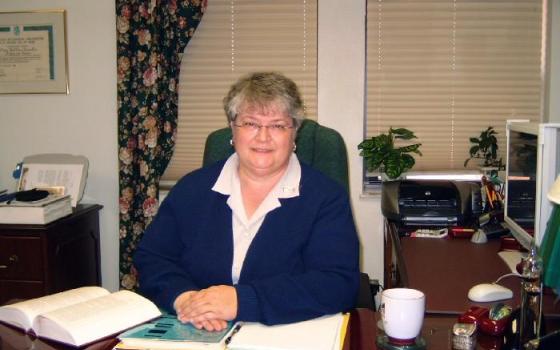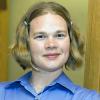Poor Handmaid of Jesus Christ Sr. Kate Kuenstler serves as an independent canon lawyer and has worked with Catholics from 30 dioceses across the United States as well as communities in the United Kingdom, Australia and Canada. In 2012, she received the Father Louis J. Trivison Award from FutureChurch for her work promoting the rights of the laity, specifically in changing Vatican policy around preserving churches as worship sites.
Kuenstler holds a J.C.D. (doctorate in canon law) and a J.C.L. (licentiate of canon law) from the Angelicum, Pontifical University of St. Thomas Aquinas in Rome as well as a master's degree in theology from Aquinas College in Grand Rapids, Michigan. Kuenstler has also served as a diocesan tribunal lawyer, religious educator at both parish and diocesan levels, and as a second-grade teacher.
GSR: What is canon law, and what do you do as an independent canon lawyer?
Kuenstler: Canon law is a code of laws and regulations written for the Catholic church. I call it the final book of Vatican II. The 1983 Revised Code of Canon Law addresses the life of the contemporary church and gives the theological context and legal parameters of how to be a Catholic in today's church. I see it as the book that should be on the shelves next to the Vatican II documents.
As an independent canon lawyer, I do not work for a bishop or anyone in the Catholic hierarchy. Almost all canon lawyers work for a bishop or church agencies. The difference of being a canon lawyer with private practice is I am not in a diocesan office or chancery or international Catholic corporation. That gives me freedom to do something that almost no one else is doing.
I am sponsored by my religious institute, the Poor Handmaids of Jesus Christ. They have missioned me formally to be an advocate for the laity as a canonical counselor. I have four areas that have developed over the last 10 years.
First, I help the laity use their voice to speak against actions of bishops that laity perceive as detrimental to their faith life.
Secondly, I give seminars about the rights and obligations of the laity as found in canon law. Laity have no clue that they are in canon law and that they have rights and obligations. Unfortunately, bishops have not made those ideas available. The laity for the most part do not know they have a right to recourse.
Thirdly, I give seminars on the associations of laity and religious institutes. I have developed a process to describe the new expression of laity in the church. I have had the privilege of giving language to it and helping laity and sisters learn what it is and isn't.
The fourth thing I do is respond to questions and concerns that laity, priests, and religious bring to me.
You have been interviewed for a film that looks at the closures of churches and mergers of parishes, particularly ethnic parishes. What context can you offer for understanding these closures and mergers?
The film I was interviewed for is "Foreclosing on Faith," and it will be shown at various film festivals internationally in 2017 and then will be out in theaters in the U.S. in 2018.
The small villages in Europe where immigrant Catholics came from had unique expressions, such as blessing of baskets at Easter. If English was not a language you knew, you needed a priest who knew your language and understood particular customs. Historically, immigrants formed a base community to have sacraments in their own language and follow their own customs. More often than not, religious-order priests were in charge of these personal (also called 'ethnic' or 'national') parishes.
In almost all dioceses, personal parishes are shut down or merged into territorial parishes. The bias is to maintain territorial parishes and divest dioceses of national parishes. Bishops remove religious-order priests, and the personal parish no longer exists. It's a cleaner way for a bishop to manage his corporation called a diocese.
That is what happens in the 30 dioceses I have worked in for the last 10 years. The bishops use the language of theology, look at a parish, and say, 'These folks don't meet that criteria.' I don't think it's the intent, but people feel punished and demoralized when this happens to their parish. Closures and mergers are a blunt instrument. This endangers the faith life of these people and has caused harm. I spend a lot of time listening to heartbroken people. Forty percent of people whose parishes have been merged leave the Catholic church. There's something wrong.
What would your advice be to a Catholic parishioner who wants to advocate and participate in diocesan planning processes that may involve mergers or closures of parishes?
I would say, 'Go in there and pay attention.' And talk to a canon lawyer. The interesting thing is there is a new development: New bishops, archbishops and cardinals appointed by Pope Francis are changing some of the way that these issues are handled. I anticipate that and have already seen that. I'm thrilled. It's very good news.
What is the spirituality that undergirds your work as a canon lawyer?
My spirituality comes out of my religious life as a proud member of the PHJC. We seek to reach out with compassion to those who are underserved, to walk with those who are powerless, and not to do things for them but energize them and give them rightful role to use their voice almost as the ruah of the Holy Spirit as the People of God.
I walk with the laity as a partner with them. I bring gifts and skills and offer them and add them to their skills and gifts and vision. I provide encouragement and validation and consolation. I listen with an open heart to the broken hearts of the laity. All of that comes from the spirituality of my own religious institute.
How is your work an expression of the PHJC charism, and how does being a part of a religious community support what you do?
Our charism is staying listening to the Word of God within and practicing discernment to bring the Incarnation into the world. We seek to name it and provide for its entrance as Mary did when the angel came to her at the Annunciation. Her response was, 'I am a poor handmaid.' That is where our title comes from. We listen for that call. We strive to walk hand-in-hand with the full Body of Christ and dream with them. We seek to encourage and welcome. We also have charism of building up leadership of laity so they are proactive and have the courage to be who they are called to be as the People of God.
I don't know how I could do my work without my community. I walk with other women, and we care about each other. The provincial and international leadership of my religious institute are so affirming and supportive.
Being in community is one of the most beautiful graces anyone can have. I'm not alone. The sisters pray for me. Their loving support makes all the difference in the world, especially on days that get long, tiring and dark. There is a candle lit for me in the hearts of my religious institute.
[Rhonda Miska is a freelance writer in Dubuque, Iowa, and teaches religious studies at Clarke University. She is a candidate with the Dominican Sisters of Sinsinawa.]

